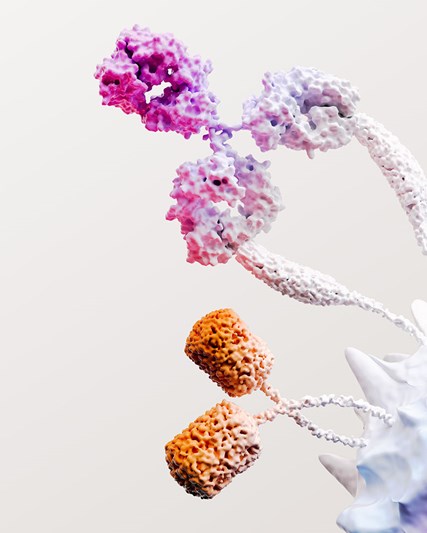Issued: London, UK
For media and investors only
Blenrep (belantamab mafodotin) combination accepted for priority review in China in relapsed/refractory multiple myeloma
- Regulatory submission supported by phase III head-to-head DREAMM-7 trial showing statistically significant efficacy, including overall survival
- If approved, Blenrep combination could redefine multiple myeloma treatment at or after first relapse
- Seventh major regulatory filing acceptance this year for belantamab mafodotin combinations in this indication, following US filing acceptance based on DREAMM-7 and DREAMM-8
GSK plc (LSE/NYSE: GSK) today announced that the National Medical Products Administration (NMPA) of China has accepted for review a new drug application (NDA) for Blenrep (belantamab mafodotin) in combination with bortezomib plus dexamethasone (BVd) as a treatment for relapsed or refractory multiple myeloma. Earlier this year, the NMPA granted priority review for this application as well as Breakthrough Therapy Designation1 for the BVd combination, which is intended to expedite development of investigational drugs with potential for substantial improvement over available therapies.2
Hesham Abdullah, Senior Vice President, Global Head Oncology, R&D, GSK, said: “Today’s regulatory filing acceptance, with a priority review, is a meaningful step forward in our efforts to bring the benefits of Blenrep in combination to patients in China. Multiple myeloma patients need new options that may improve outcomes, particularly at first relapse. The DREAMM-7 trial shows statistically significant efficacy, including overall survival and could redefine treatment in this patient population.”
This is the seventh major regulatory filing acceptance this year for belantamab mafodotin in combination for the treatment of relapsed or refractory multiple myeloma based on the results of the DREAMM-7 and DREAMM-8 trials. In 2024, belantamab mafodotin combinations have been accepted for review in the US3, European Union4, Japan5 (with priority review), United Kingdom, Canada and Switzerland (with priority review for DREAMM-8).
The application is based on the interim results of the phase III head-to-head DREAMM-7 trial, which met its primary endpoint, showing statistically significant and clinically meaningful improvement in progression-free survival (PFS) for BVd compared to daratumumab plus bortezomib and dexamethasone (DVd) in relapsed or refractory multiple myeloma. In a subsequent planned interim analysis, the DREAMM-7 trial met the key secondary endpoint of overall survival (OS), showing that BVd significantly reduced the risk of death versus standard of care DVd.
About multiple myeloma
Multiple myeloma is the third most common blood cancer globally and is generally considered treatable but not curable.6,7 There are approximately more than 180,000 new cases of multiple myeloma diagnosed globally each year.8 In China, multiple myeloma is a growing health concern with approximately 30,000 new cases each year.9 The incidence of multiple myeloma in China has doubled and mortality has increased 1.5-fold in the past three decades.10 Research into new therapies is needed as multiple myeloma commonly becomes refractory to available treatments.11
About DREAMM-7
The DREAMM-7 phase III clinical trial is a multicentre, open-label, randomised trial evaluating the efficacy and safety of belantamab mafodotin in combination with bortezomib plus dexamethasone (BVd) compared to a combination of daratumumab and bortezomib plus dexamethasone (DVd) in patients with relapsed/refractory multiple myeloma who previously were treated with at least one prior line of multiple myeloma therapy, with documented disease progression during or after their most recent therapy.
A total of 494 participants were randomised at a 1:1 ratio to receive either BVd or DVd. Belantamab mafodotin was scheduled to be dosed at 2.5mg/kg intravenously every three weeks.
The primary endpoint is PFS as per an independent review committee. The key secondary endpoints include OS, duration of response (DOR), and minimal residual disease (MRD) negativity rate as assessed by next-generation sequencing. Other secondary endpoints include overall response rate (ORR), safety, and patient reported and quality of life outcomes.
Results from DREAMM-7 were first presented12 at the American Society of Clinical Oncology (ASCO) Plenary Series in February 2024, shared in an encore presentation at the 2024 ASCO Annual Meeting, and published in the New England Journal of Medicine.
About Blenrep
Blenrep is an antibody-drug conjugate comprising a humanised B-cell maturation antigen monoclonal antibody conjugated to the cytotoxic agent auristatin F via a non-cleavable linker. The drug linker technology is licensed from Seagen Inc.; the monoclonal antibody is produced using POTELLIGENT Technology licensed from BioWa Inc., a member of the Kyowa Kirin Group.
Blenrep is approved as monotherapy in Hong Kong. Refer to the local Summary of Product Characteristics for a full list of adverse events and complete important safety information.
GSK in oncology
Oncology is an emerging therapeutic area for GSK where we are committed to maximising patient survival with a current focus on haematologic malignancies, gynaecologic cancers, and other solid tumours through breakthroughs in immuno-oncology and tumour-cell targeting therapies.
About GSK
GSK is a global biopharma company with a purpose to unite science, technology, and talent to get ahead of disease together. Find out more at gsk.com.
Cautionary statement regarding forward-looking statements
GSK cautions investors that any forward-looking statements or projections made by GSK, including those made in this announcement, are subject to risks and uncertainties that may cause actual results to differ materially from those projected. Such factors include, but are not limited to, those described under Item 3.D “Risk factors” in GSK’s Annual Report on Form 20-F for 2023, and GSK’s Q3 Results for 2024.
References
- GSK press release issued 13 September 2024. Blenrep (belantamab mafodotin) in combination receives Breakthrough Therapy Designation in China for treatment of relapsed/refractory multiple myeloma. Available at: https://www.gsk.com/en-gb/media/press-releases/blenrep-belantamab-mafodotin-in-combination-receives-breakthrough-therapy-designation-in-china-for-treatment-of-relapsedrefractory-multiple-myeloma/.
- China Drug Registration Regulation. Available at: http://www.gov.cn/gongbao/content/2020/content_5512563.htm. Accessed 1 October 2024.
- GSK press release issued 25 November 2024. Blenrep combinations accepted for review by the US FDA for the treatment of relapsed/refractory multiple myeloma. Available at: https://www.gsk.com/en-gb/media/press-releases/blenrep-combinations-accepted-for-review-by-the-us-fda-for-the-treatment-of-relapsedrefractory-multiple-myeloma/.
- GSK press release issued 19 July 2024. Blenrep (belantamab mafodotin) combinations in multiple myeloma accepted for review by the European Medicines Agency. Available at: https://www.gsk.com/en-gb/media/press-releases/blenrep-belantamab-mafodotin-combinations-in-multiple-myeloma-application-accepted-for-review-by-the-european-medicines-agency/.
- GSK press release issued 17 September 2024. Blenrep (belantamab mafodotin) combinations in relapsed/refractory multiple myeloma accepted for regulatory review in Japan. Available at: https://www.gsk.com/en-gb/media/press-releases/blenrep-belantamab-mafodotin-combinations-in-relapsedrefractory-multiple-myeloma-accepted-for-regulatory-review-in-japan/.
- Sung H, Ferlay J, Siegel R, et al. Global Cancer Statistics 2020: GLOBOCAN Estimates of Incidence and Mortality Worldwide for 36 Cancers in 185 Countries. CA Cancer J Clin. 2021;71(3):209-249. doi:10.3322/caac.21660.
- Kazandjian D. Multiple myeloma epidemiology and survival: A unique malignancy. Semin Oncol. 2016;43(6):676–681.doi: 10.1053/j.seminoncol.2016.11.004.
- Global Cancer Observatory. International Agency for Research on Cancer. World Health Organization. Multiple Myeloma fact sheet. Available at: https://gco.iarc.who.int/media/globocan/factsheets/cancers/35-multiple-myeloma-fact-sheet.pdf. Accessed 1 October 2024.
- Global Cancer Observatory. International Agency for Research on Cancer. World Health Organization. China fact sheet. Available at: https://gco.iarc.who.int/media/globocan/factsheets/populations/160-china-fact-sheet.pdf. Accessed 12 September 2024.
- Liu J, Liu W, Mi L, et al. Burden of multiple myeloma in China: an analysis of the Global Burden of Disease, Injuries, and Risk Factors Study 2019. Chin Med J (Engl). 2023;136(23):2834-2838. Published 2023 Dec 5. doi:10.1097/CM9.0000000000002600.
- Nooka AK, Kastritis E, Dimopoulos MA. Treatment options for relapsed and refractory multiple myeloma. Blood. 2015;125(20). doi:10.1182/blood-2014-11-568923.
- GSK press release issued 05 February 2024. DREAMM-7 phase III trial shows Blenrep combination nearly tripled median progression-free survival versus standard of care combination in patients with relapsed/refractory multiple myeloma. Available at: https://www.gsk.com/en-gb/media/press-releases/dreamm-7-phase-iii-trial-shows-pfs-improvement-and-strong-os-trend-for-blenrep-combo-versus-soc-combo-in-multiple-myeloma/.



